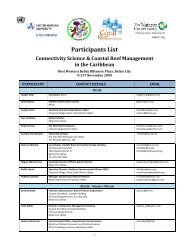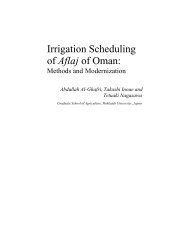The Global Water Crisis: Addressing an Urgent Security - Unu-inweh ...
The Global Water Crisis: Addressing an Urgent Security - Unu-inweh ...
The Global Water Crisis: Addressing an Urgent Security - Unu-inweh ...
Create successful ePaper yourself
Turn your PDF publications into a flip-book with our unique Google optimized e-Paper software.
a system, coupled with a Decision Support System (DSS), might enable modelling <strong>an</strong>d water predictions, which<br />
could in turn inform decision-makers. <strong>The</strong> need for such modelling <strong>an</strong>d information across the WANA region is<br />
imperative to establishing viable <strong>an</strong>d practical solutions for shared water m<strong>an</strong>agement. Furthermore, the value<br />
of water information is key in pl<strong>an</strong>ning <strong>an</strong>d assessment <strong>an</strong>d is also import<strong>an</strong>t in research <strong>an</strong>d development <strong>an</strong>d<br />
for project monitoring. Finally, data must be available <strong>an</strong>d accessible to civil society <strong>an</strong>d the public <strong>an</strong>d private<br />
sectors in order to facilitate investment, raise awareness <strong>an</strong>d improve the level of pl<strong>an</strong>ning <strong>an</strong>d tr<strong>an</strong>sparency.<br />
Nevertheless, the political will to share information <strong>an</strong>d pool data is essential, <strong>an</strong>d positive examples of this exist<br />
elsewhere in the world; it is now up to governments in the WANA region to prove <strong>an</strong>d demonstrate the potential<br />
benefits of knowledge-sharing on water information through cooperation <strong>an</strong>d goodwill.<br />
• Alternative resources. In a water-scarce region such as the WANA region, where groundwater <strong>an</strong>d river basins<br />
often are not reliable sources of water, there is a need to find non-conventional sources of water. With growing<br />
populations <strong>an</strong>d limited water availability, water supply c<strong>an</strong> be a source of economic growth <strong>an</strong>d potential,<br />
particularly in the Gulf, where freshwater supply is particularly limited. <strong>Water</strong> c<strong>an</strong> only be discussed in the Gulf<br />
in the context of desalination, where saltwater provides the majority of the water in the region. Furthermore, in<br />
order to overcome the expected water deficit estimated at 240 billion cubic metres 2 , projected to occur by 2025<br />
(World B<strong>an</strong>k, 2007), it will be necessary to increase supply through new sources <strong>an</strong>d options such as increased<br />
dependency on desalination, increased reuse of adequately treated wastewater sources, <strong>an</strong>d reasonable mining<br />
of non-renewable groundwater sources. It will be equally import<strong>an</strong>t to address climate ch<strong>an</strong>ge impacts through<br />
mitigation efforts, combined with efforts to implement measures for integrated water m<strong>an</strong>agement that are<br />
coordinated with other development policies <strong>an</strong>d reflect the prevailing harsh, arid environment, <strong>an</strong>d social,<br />
economic <strong>an</strong>d cultural conditions.<br />
• Environmental sustainability <strong>an</strong>d efficiency measures. An effective water resources m<strong>an</strong>agement framework<br />
in line with the IWRM approach is essential. Such a framework must emphasize: enh<strong>an</strong>ced water use efficiency<br />
<strong>an</strong>d justified allocation in all development sectors; a supply-dem<strong>an</strong>d model supported by effective <strong>an</strong>d enforced<br />
institutional arr<strong>an</strong>gements <strong>an</strong>d legal frameworks; m<strong>an</strong>dated coordination with other related policies; effective<br />
stakeholder participation; strengthening of water govern<strong>an</strong>ce issues; development of partnerships with the private<br />
sector; effective regional cooperation through the United Nations <strong>an</strong>d regional org<strong>an</strong>izations; a commitment of<br />
adequate fin<strong>an</strong>cial <strong>an</strong>d trained hum<strong>an</strong> resources; <strong>an</strong>d, preservation of environmental integrity. Such a complex<br />
IWRM approach will enable governments of the region to shift from rigid, traditional approaches of supply<br />
augmentation <strong>an</strong>d their role as services providers to the implementation of more flexible integrated m<strong>an</strong>agement<br />
measures <strong>an</strong>d to act as regulators of services.<br />
• Regional development pl<strong>an</strong>. To seek a genuine solution for the water crisis in the WANA Region, <strong>an</strong>d taking political<br />
will as a pre-condition, m<strong>an</strong>y scenarios to overcome <strong>an</strong>y potential conflict over water in the region c<strong>an</strong> realistically<br />
be made which are also economically viable. What is required at this stage is a shift from a consultative <strong>an</strong>d conceptbuilding<br />
mode to the development of a new master pl<strong>an</strong> for water <strong>an</strong>d l<strong>an</strong>d use in the region. <strong>The</strong> question that<br />
needs to be addressed, however, is how to formulate <strong>an</strong> integrated development pl<strong>an</strong> that takes into consideration<br />
the rising conflict over water resources due to the tension between upper <strong>an</strong>d lower ripari<strong>an</strong> states. A regional<br />
solution c<strong>an</strong> only be achieved with regional projects that take into account the equity of water needed among<br />
all countries in the region. One example of such a project is the proposed Red-Dead Sea C<strong>an</strong>al (Sharp, 2008). <strong>The</strong><br />
project aims to pump vast qu<strong>an</strong>tities of water from the Red Sea in the Gulf of Aqaba to the Dead Sea, situated 417<br />
metres below sea level. <strong>The</strong> convey<strong>an</strong>ce would be utilized to generate hydroelectricity <strong>an</strong>d desalinate water, with<br />
drinking water pumped to regional population centres, <strong>an</strong>d desalination brine discharged into the Dead Sea in <strong>an</strong><br />
attempt to arrest its shrinkage. This project is being promoted as <strong>an</strong> initiative to cement peace in the region. <strong>The</strong><br />
cost of the project has been estimated at US $5 billion over 20 years (Sharp, 2008). This massive effort requires<br />
both international technical <strong>an</strong>d fin<strong>an</strong>cial support <strong>an</strong>d cooperation. A recently completed environmental impact<br />
study fin<strong>an</strong>ced by the World B<strong>an</strong>k concluded that the impacts of abstracting millions of cubic metres of seawater<br />
from the Red Sea are negligible, according to the preliminary Red Sea Modelling Study (World B<strong>an</strong>k, 2009). Regional<br />
development pl<strong>an</strong>s may also wish to consider the concept of Virtual <strong>Water</strong> (e.g. All<strong>an</strong>, 1997) as a way to reduce<br />
tr<strong>an</strong>sboundary conflicts by affecting water resources developments in tr<strong>an</strong>sboundary waters (Hashemi, 2012). As<br />
shown in Figure 2, Virtual <strong>Water</strong> policy c<strong>an</strong> shift attention to Green <strong>Water</strong> (soil moisture <strong>an</strong>d water consumed by<br />
2 <strong>Water</strong> dem<strong>an</strong>d is expected to reach 500 billion m 3 while water supply is projected to be 260 billion m 3 .<br />
54 <strong>The</strong> <strong>Global</strong> <strong>Water</strong> <strong>Crisis</strong>: <strong>Addressing</strong> <strong>an</strong> <strong>Urgent</strong> <strong>Security</strong> Issue




